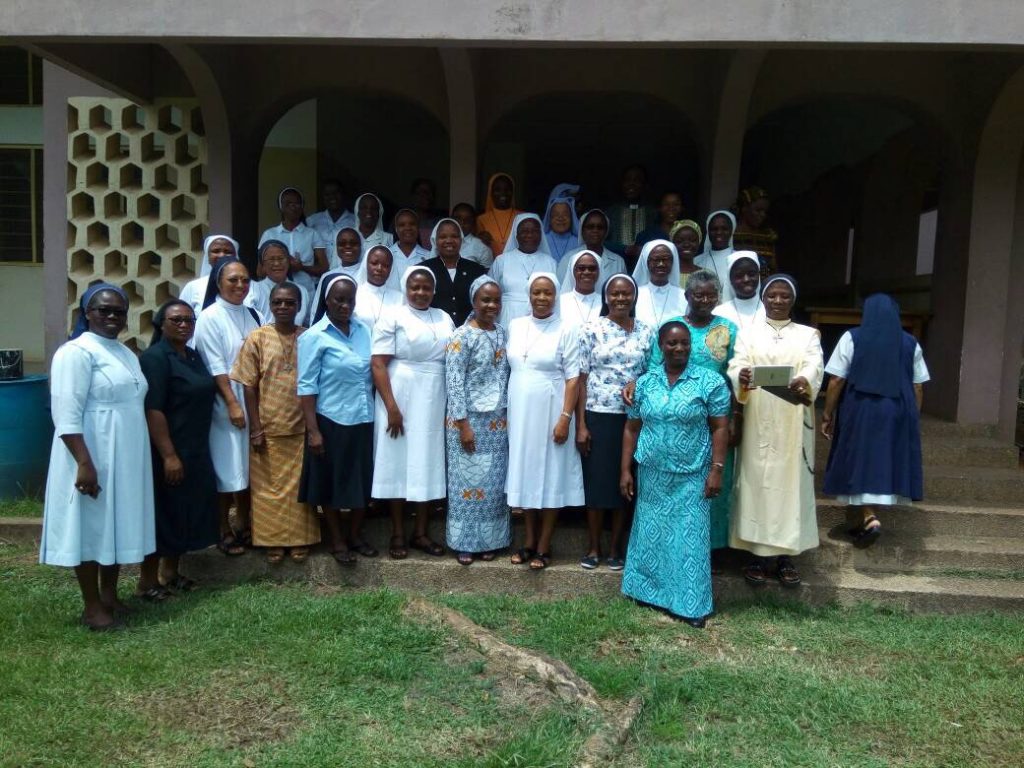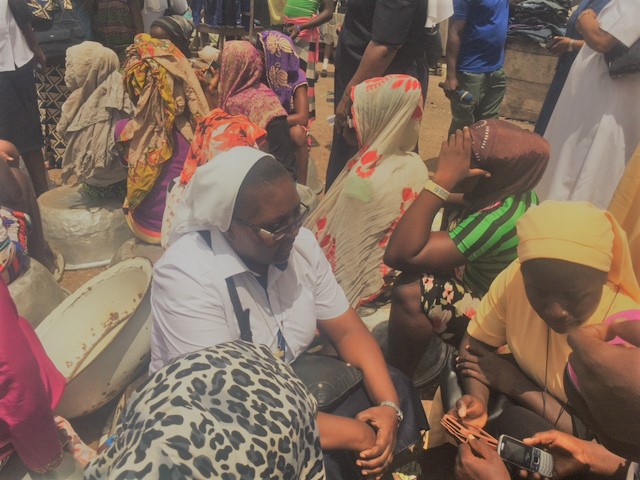In May 2017, members of the Africa Faith & Justice Network team met with the major superiors of Ghana, encouraging them to engage structures of injustice in their communities while continuing to provide services to the people, thus sustaining the gains of sisters’ charity work. From October 7-11, 2017, at the request of the major superiors, AFJN held a follow-up gathering to train Ghanaian sisters on how to engage structures of injustice.
Before the October gathering, the AFJN team listened to the sisters’ concerns, ranging from environmental problems to violence against women and children in Ghana; the biggest concern emerged as the phenomenon of the Kayayei (female porter) where poor young Ghanaian women, age 7 years and above, migrate to larger cities to carry traders and shoppers’ wares and purchases on top of their heads for little money.
At this gathering which was held at the John Paul II Center in Ofoase Kokoben in Obuasi diocese and was attended by over 35 sisters as well as five major superiors from various religious communities, the AFJN team reflected with the sisters on the current impact of their mission of service provision, ways the sisters could continue to be relevant in 21st century Ghana, and how the sisters will continue to sustain the gains of their work of works, given the high levels of poverty and its social consequences. This reflection, which was guided by the principles of Catholic social justice tradition and the papal encyclicals, enabled the sisters to recognize the importance of advocacy and taking action on behalf justice for those living in poverty.
Given that the mission of the sisters in Ghana largely concerns women, youth and children, the AFJN team tailored the social analysis session to the Kayayei phenomenon that the sisters previously raised. At the end of the analysis, which began with sisters having varying understanding of the causes of the problem and its consequences, the sisters unanimously recognized the injustice that is meted on this group and the negative consequences on family life and society at large. They also recognized the vulnerability of these young women. Perceiving them liable to trafficking and sexual exploitation due to their lack of social protection as they spend their nights and days on the street, the sisters were compelled to take action on behalf of justice on the eve of the International Day of the Girl Child. They devoted a full day of the workshop to embark on practical advocacy on behalf of this population of young women.
The sisters paid a solidarity visit to a group of Kayayei at the corner of the Kumasi central market where these women huddle together to rest. During the visit, the sisters engaged the Kayayei in a group setting as well as one-on-one conversation, assuring them that they are loved by God. Engaging the media to expose the situation, the sisters spoke against the dehumanization of this population and laid bare to the public the negative implications to the nation of all kinds of abuses meted out to these young women. They demanded protective social and family environments for the women and their kids that they raise on the street, requesting the government and public work together to ensure that the Kayayei situation is ended in Ghana. The sisters also provided the Kayayei the opportunity to speak to the public through media. It was a delight to watch the young women speak their truth with courage and confidence, especially when one of them asked the government to stop using their plight to “play politics,” making promise after promise yet failing to fulfill those pledges.
The sisters also visited the supreme leader of the Asanti Kingdom that includes Kumasi city, the Ashantehene, the Kumasi regional minister, and the mayor of the city, because they consider these entities as having the power to influence change. The sisters demanded that they use their political and traditional powers to ensure the rights and well being of the Kayayei as well as their children. They also requested from these entities a stronger partnership with the church, given that the church, through a religious community, established a rehabilitation program for these young women and their children when they agree to come off the street.
At the end of the advocacy event, the sisters were delighted that they took action on behalf of justice. Most of them who have never encountered the Kaiyayei were grateful to have this experience. The visit, they said, provided then an opportunity for mutual learning and expression of emotion. On behalf of the AFJN team, it was amazing watching the intensity and quality of conversation between the sisters and the young women. We express thanks to the sisters for speaking to these young women in their local languages and sharing sitting spaces with them during the visit. These simple gestures (speaking in languages the Kayayei could understand and sitting in close proximity with them), we believe, made the Kayayei feel valued as human beings and empowered to engage the sisters and the public. It was also a pleasure to see the women in the public engaging the sisters, promising to join them in their efforts to advocate for the end of Kaiyayei.
The training came to an end with the creation of a core group of sisters from various communities who will keep the energy going and call the sisters to action when the need arises. The group will coordinate the follow-up visit to the Ashenthene and the Queen Mother, the Kumasi regional minister, and the city mayor, as well as plan and coordinate the sisters’ advocacy trip to northern Ghana where most of the Kayayei come from to meet with local leaders and parents. AFJN and the sisters in Ghana remain grateful to the Conrad Hilton Foundation for sponsoring this project.



